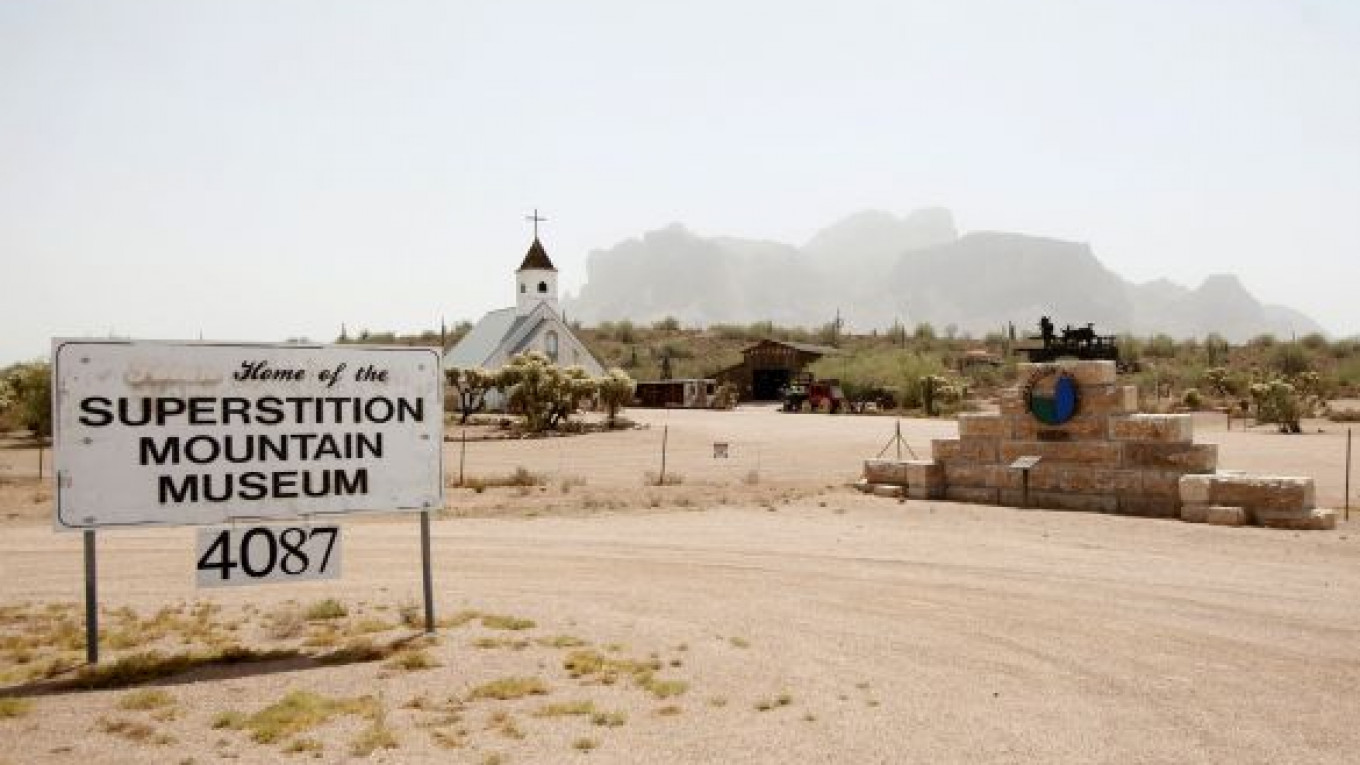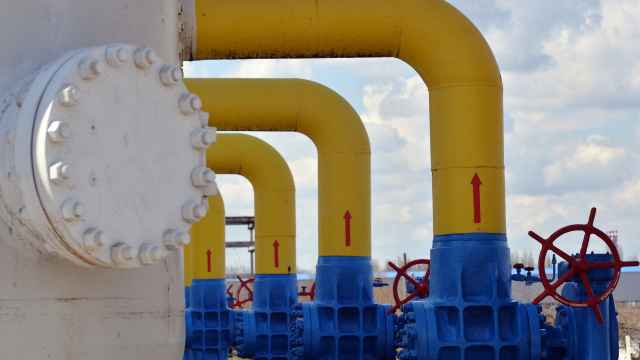Treasure seekers have trekked into Arizona's Superstition Mountains in search of a lost gold mine for more than a century. Three years ago, Italian economics professor Alberto Micalizzi, whose hedge fund was on the verge of collapse, looked to the nearby town of Apache Junction to shore up his own fortune.
After his fund lost investors hundreds of millions of dollars in the credit crunch, Micalizzi quietly moved most of its assets into bonds in late 2008.
These were no ordinary bonds.
They were $500 million of highly illiquid paper purportedly issued by a company in a trailer-park suburb of Phoenix on behalf of a small Australian commodities firm — and backed by the proceeds from $10 billion of diesel from the tiny Russian republic of Bashkortostan.
The bonds proved to be impossible to sell, and the professor's Cayman Island-based fund, DD Growth Premium, went into liquidation in spring 2009. The fund's implosion left behind a band of irate investors and an enduring riddle as to what exactly happened.
Reuters followed a paper trail from the fund's offices in the upmarket London neighborhood of Kensington to the dusty American southwest, from the fund's registered home in a Caribbean tax haven to a suburban house in Canberra, Australia.
The story's cast includes an Arizona businessman on the run from U.S. authorities, a Russian allegedly convicted for fraud, and the Italian at the center of it all: a 42-year-old specialist in options pricing who teaches economics at the respected Bocconi University in Milan.
What emerges is a cautionary tale from the wilds of offshore finance, a lesson to investors about how easy it is to be drawn into a global maze of paper companies with little substance.
Micalizzi's saga shows how the United States' role in the global proliferation of anonymous shell companies may enable fictitious assets to be magically transformed into real ones for a time, siphoning money from unwitting investors along the way.
Since the terrorist attacks of Sept. 11, 2001, the United States has called on other nations to clean up dubious money flows. International watchdogs such as the Financial Action Task Force are urging all countries to collect data on the real owners of corporations. The goal: reduce the movement of illicit funds by shining a brighter light on so-called beneficiaries, who can use shell companies to open bank accounts, hide assets or create fake ones, and avoid taxes.
But few countries have acted.
The United States itself has allowed several states to emerge as secrecy havens — including Nevada, where the Arizona-based company behind Micalizzi's bond mystery is formally incorporated. Nevada state law allows "nominees" to be appointed in place of real directors and officers, making it harder to detect who is behind companies.
The deal's global paper trail, compiled from corporate registries and legal records as well as documents and e-mails supplied by a person with close knowledge of the situation, led Reuters to a half dozen firms. Some were incorporated in one jurisdiction while listing business addresses in another, a common shell company strategy, said law enforcement officials and private investigators. In almost every case in which Reuters reporters knocked on the doors of firms that were said to be managing the massive oil-backed debt deal, however, nobody answered.
Investigation Reopened
Micalizzi has not been charged with any crime. British investigators dropped a probe in July 2010, saying it would "not produce evidence sufficient to give rise to a realistic prospect of conviction."
But a judge in an Irish civil lawsuit between two investors in one of Micalizzi's funds last year ruled the Italian had knowingly given a false picture to investors. He had, the judge found, set up "a fraudulent scheme" to persuade one to invest in order to pay off another — akin to a Ponzi scheme. The Financial Services Authority, which regulates Britain's financial industry, earlier this year reopened its investigation into "the provenance and value of the … bonds."
Micalizzi declined to be interviewed, saying in a June e-mail that "since the last wave of unfounded speculations raised against me and my company, which happened during 2009, there is nothing news as far as I am concerned."
For investors hoping to get some of their cash back, though, there are still plenty of questions to answer. Does the oil that backs the bonds exist? Who are the people behind the bonds? And what exactly are their connections to Micalizzi?
The money trail begins in London's Kensington, where Micalizzi, an expert in options pricing, started his firm, Dynamic Decisions Capital Management, or DDCM, in 2004. The equity fund used a strategy of pairs trading — matching long positions in one stock with short positions in others to try to make money whether the market was rising or falling.
The fund's directors included Michael Nobel, great-grandnephew of the founder of the Nobel Prize. It pulled in big name investors such as RMF, which is part of Man Group, the world's biggest listed hedge fund manager, London-based Strathmore, and a subsidiary of the Ontario Teachers' Pension Plan Board.
The fund used a master-feeder structure, a setup employed by many hedge fund managers. A master fund — the DD Growth Premium Master Fund — was fed by smaller ones. DDCM mostly picked large-cap U.S. and European equities, and limited any single position to 6 percent of assets. But in late 2008, as the financial crisis was wrecking investments around the world, it unexpectedly moved most of its assets into bonds. These unusual instruments were part of an issue of highly illiquid paper that ostensibly gave rights to future deliveries of up to $10 billion worth of diesel fuel from Bashkortostan in the Ural Mountains.
'Substantial Losses'
In January 2009, Micalizzi wrote to investors that the previous year had been one of "continued success" despite market turbulence. He told them that assets in the two feeders had expanded to $475 million from $360 million, and outlined plans to increase the transparency of the fund's positions and launch two new ones. "I feel each of the shocks from 2008 strengthened our organization," he wrote.
The fund finally revealed the extent of its problems in March 2009. In a conference call for investors, DDCM director Humphrey Polanen acknowledged that "substantial trading losses" meant total assets were actually only $20 million to $30 million. According to a KPMG investigation ordered by DDCM directors, the fund's losses on options trading were $250 million between August and November 2008 alone.
What's more, the "substantial losses" incurred in 2008 "were concealed from the investors," wrote financial consultancy Zolfo Cooper, which was appointed liquidator of one of the feeder funds, in a May 2009 report, a copy of which was reviewed by Reuters.
Investors and outside directors were irate. "In 2008 things looked to me to be going rather well as the overall rates of return seemed satisfactory in light of the general economic situation," director Michael Nobel said in an interview. "The next we know, the thing had imploded. We had not been kept abreast of what he'd done. We did see a purchase and sales agreement, which looked entirely bogus to me, with weird names and fancy coats of arms. It was very, very unreliable — that was the general consensus of the external board."
Asked where he thought the money had gone, Nobel said: "That's an excellent question. I wish I could give you a good answer. … We asked the same question and never got a clear answer."
Investors became even more concerned when they looked into the origin of the bonds, whose coupon and principal payments were meant to be guaranteed by oil futures, and which could be converted into either physical oil or cash.
A copy of the offer document for the bonds, shown to Reuters by a source with close knowledge of the situation, contains a number of red flags.
The document, from a U.S.-based company, told of vague plans to spend the $10 billion on "the purchase of lands, commodities and other related business." Almost $4 billion was earmarked for the "first grassroots U.S. refinery in 30 years" and a crude oil delivery system. Almost $2 billion would go to a "waste-to-ultra clean fuel-power project." Another $1.4 billion was headed for a five-star resort in Fiji.
Reuters asked Paul Barnes, professor of Fraud Risk Management and director of the International Fraud Prevention Research Center at Nottingham Business School, to examine the offer document. His response: "Total nonsense. It's a scam."
The document, Barnes said, is "cobbled together with information that's largely irrelevant to give the impression of seriousness. Because it's global, it's as if it transcends all regulatory regimes. The big numbers do not impress me as an investor as I can't see the security behind the bonds. The fact they're asking for a lot of money may be a way of gaining credibility."
The two feeder funds and the master fund were put into liquidation in March and April 2009; the board removed Micalizzi and prohibited him from talking to investors. Even after he was fired, the Italian maintained that the bonds were a great buy. He had bought them "to temporarily ride out the storm," he wrote in an April 2009 statement. "It is my honest belief that the bonds are genuine and have value, and can still be sold as to pay out redeeming investors and creditors in whole or in part."
The deal was still unusual. According to liquidator Zolfo Cooper, DDCM's Master Fund had bought U.S. $700 million worth of paper for just $310 million from an Australian firm called Pacific Global Oil Australia Pty Ltd (PGO). Micalizzi said he planned to sell the bonds on immediately. But when he couldn't find a buyer, the fund resold half the bonds — $350 million worth — back to PGO for $305 million, plus a $31 million fee for acting as distributor of the bonds.
This left DDCM holding bonds with a face value of $350 million for which it had paid just $5 million. At the same time, another Australian company closely related to PGO, called Nexus Management, gave DDCM $150 million worth of the same oil-backed bonds in return for a $75 million stake in the fund, in a transaction directly authorized by the fund's directors.
Netting it out, and including a $1.25 million listing fee, Micalizzi and DDCM had spent just $6.25 million and given away a stake in the fund worth $75 million, according to Reuters calculations. In return, it had become the owner of bonds with a face value of half a billion dollars.
The bonds were then added to the fund's balance sheet at the end of 2008 with a value of $462.4 million.
Fund administrator PNC, now part of BNY Mellon, was responsible for preparing financial statements for the fund. It declined to comment, other than to confirm its role. Daniele Palla, an Italian commodities trader who described himself as a representative of PGO, said in an interview that Micalizzi had signed purchase agreements with PGO to buy $500 million of bonds and made a down payment of $5 million. But when he didn't pay the full amount the bonds were canceled. "He [Micalizzi] cheated us," Palla said. "He signed the contract, purchased a number of bonds, and he didn't pay for it. He defaulted on it. … Both PGO and Nexus are victims of this situation."
Raising Arizona
The bonds' history is perplexing. They were originally issued in 2008 by a tiny company called Asseterra Inc., based in the small town of Apache Junction, Arizona, and incorporated in Nevada.
Asseterra's president, chief executive, secretary, director and treasurer is David Spargo. He has run two other firms from the same address as Asseterra. One of these, a venture capital firm, was closed last year when it failed to file accounts and ran into trouble over a bond issue, according to U.S. federal court records.
Asseterra said when it issued the bonds that it was acting on behalf of Pacific Global Oil. But liquidators Zolfo Cooper said in a report to creditors that Asseterra was in fact a special purpose vehicle set up by Pacific Global Oil to issue them.
According to public records and interviews by Reuters, Spargo did in fact set up a physical location for Asseterra — in an Apache Junction strip mall located on Superstition Boulevard, next door to The Dog Run Saloon and one block from the local police station.
A property manager for the suite said Spargo listed another firm, Napis Inc., as the resident business and always paid his rent on time until the lease expired in December 2009. Nobody interviewed in Apache Junction over two days, including four city and county government officials and executives from businesses located nearby, had heard of Asseterra Inc.
Asseterra's base of Apache Junction, population 37,000, consists of trailer parks and sand about 55 kilometers east of Phoenix. The town is home to a grassless golf course called the Snakehole and serves as a launch pad for people searching for the Lost Dutchman Gold Mine. Residents say no gold has ever been found.
Property records indicate that Spargo lives on Saguaro Drive just north of town. A visit by a reporter showed that the property is a vacant lot with a no-trespassing sign and some cactuses. A separate address for Spargo in Mesa, Arizona, is a stucco home that went into foreclosure last year. In January 2009, a federal judge in Arizona ordered Spargo's Napis Inc. to repay $5.5 million to investors in bonds that the company had said it would register for sale in Luxembourg, according to documents in three separate lawsuits in Texas, Virginia and Arizona filed since 2006 and related to the judgment. It is unclear what assets backed the bonds. The investors said in the lawsuits that they were defrauded by other companies that used their funds to buy the dubious Napis-issued paper.
For two years, Napis and Spargo refused to pay the judgment and have not responded to requests for documents. On Jan. 5, the Arizona court issued a warrant for Spargo's arrest on a contempt charge in the case, according to court records.
Spargo has not been seen since. Philip Rudd, an attorney for one of the plaintiffs in the case, said he is believed to have left the country. Spargo's wife, Karen, could not be located for comment.
Spargo did not respond to requests for comment sent to an e-mail address for Asseterra. Three Arizona attorneys who represented him in the Napis case resigned in October 2009. They did not respond to requests for comment. Michael Kessler, an attorney for Spargo in a Texas lawsuit related to the judgment, did not respond to a request for comment.
Like Asseterra, Canberra-based Pacific Global Oil is a company that leaves little trace of its existence. In documents relating to the bond deal, the firm describes itself as "a premier provider of commodities solutions."
But its quoted fax and phone numbers "have proved to be unobtainable, and information provided by Micalizzi regarding PGO has proved to be inaccurate," according to liquidators Zolfo Cooper.
"The liquidators consider it surprising that PGO had guaranteed bonds over $10 billion but had a capital of just AUS $1,000 and in addition PGO do not appear to have engaged either lawyers or accountants in relation to the issue of the bonds," Zolfo Cooper said.
PGO is closely linked to Nexus Management, the company that gave $150 million worth of oil-backed bonds to DD Growth Premium Master Fund in return for a $75 million stake. Both firms share the same address as their head office and principal place of business — a residential block of flats in Canberra. A reporter visited all three of Nexus' Canberra offices but found little evidence of the company. At one address — a house in a well-to-do suburb — movement could be heard inside, but nobody answered the door on repeated visits. The lawn had been mowed and the mail collected, but the listed phone number did not work.
The judge in last year's case in Ireland — it pitted one investor in a DDCM fund against another rather than against Micalizzi — said any link between Nexus and the Italian professor is "not clear and the subject of some controversy." The judge speculated that Nexus might be "a genuine party" or else "simply a vehicle either controlled by Dr. Micalizzi or, although independently controlled … happy to work along with Dr. Micalizzi."
Nexus' main representative in its dealings with DDCM was Italian commodities trader Palla, whose company, World Source Group, is registered in the United Arab Emirates and describes itself as "a leader in the commodities world market." World Source Group was the sales agent for the Asseterra bonds, meaning that it was supposed to sell the oil futures on the market if the holder chose to convert them. But Palla said World Source was dormant and had moved its operations to Britain. A company search showed that it had shareholder funds last year of £736 ($1,200). Palla said the bonds themselves were genuine. "I base all my activities on the facts, things that are verifiable in black and white, such as these documents. If something arrives on my desk, if it's genuine, 100 percent, I proceed. If it's not, I walk away."
The Russian Angle
Reuters was unable to verify whether the oil futures backing the bonds are black and white fact. According to a KPMG investigation, the diesel is to be delivered by a company called Technokom in Bashkortostan. Technokom's web site offers only an e-mail address as a means of contact, but the company did not respond to requests for comment.
A deed of assignment seen by Reuters shows that the oil futures originally came from a Spanish-based charity, the International Charitable Christian Fund, or ICCF, which boasts on its web site that it is "responsible for everything which is taking place in this world."
On the deed, ICCF says it has operations in countries including Russia, the United States, Australia and Costa Rica. It is not registered in Spain as a foundation, although it is listed at the National Companies Register, where its activity is stated as "the purchase, sale and management of real estate." The register also indicates that ICCF has equity of 3,200 euros ($4,575).
ICCF is run by a Russian businessman named Vladimir Kobzar, who also turns out to be a 25 percent shareholder in Canberra-based Pacific Global Oil.
German magazine Focus has reported that ICCF faced allegations of money laundering in the mid-2000s after trying to provide financing for a Dresden-based engineering company. Columbian radio station Caracol reported in 2006 that the Russian Embassy in Bolivia had issued a warning against ICCF and Kobzar over an attempted scam.
A 2002 report in Vremya Novostei says Kobzar spent more than a decade in jail for theft. In 1996 and 1997, ICCF offered the Russian government and a number of regional authorities long-term loans that paid 7 percent a year interest, according to the newspaper. In return, Moscow and the regions would issue a "veksel" — an IOU — backed by the property of Russian companies. ICCF said it would then give every Russian citizen $50,000.
Russian special services concluded that ICCF's bonds did not exist, according to the paper, and warned regional governments to beware. Kobzar was later involved in another fraud attempt, the paper says, before having an "explanatory meeting" with Russian special services.
His criminal conviction could not be independently verified. Official records in Russia from that period are often difficult to obtain, and a reporter was not able to contact Kobzar directly. But Irina Bekhtina, who also works at ICCF in Spain, played down the reports of Kobzar's alleged criminal past. "[It's] not at all the truth," she said. "Vladimir has been in prison for one year in the '80s for nothing; there was no case of accusation."
The experience, she said, helped "train him to be strong, to be very precise. … Our organization is totally clean. All of [the reports] were lies."
Nexus' Palla also defended Kobzar, saying the Russian had been approached by PGO after an introduction through an intermediary. "He's a good boy, despite what you see on the Internet," Palla said. "Prior to talking, Mr. Kobzar always proves what he's going to talk about. I don't know much about his past."
Probe Goes Nowhere
In late 2009, under pressure from investors, Britain's Financial Services Authority referred the DDCM case to the Serious Fraud Office, which opened a criminal investigation.
Eight months later the office decided that there wasn't enough evidence to prosecute. Minutes from a stakeholder meeting held by Zolfo Cooper in 2010 say the SFO "indicated that they had not received much support from investors" for the probe.
Some key parties — including Zolfo Cooper — offered to help but were not contacted by the Serious Fraud Office. Reuters presented the office with its findings and offered to discuss the documents it uncovered, but the SFO has so far not taken up this offer. The SFO, whose resource budget has been cut 34 percent since 2009, declined to comment.
Complicating investors' attempts to investigate DDCM is the company's domicile in the Cayman Islands. The tax haven is the world's fifth-largest financial center and hosts almost two-thirds of the world's hedge funds. But its secrecy laws are tight.
One reason investors may have been reluctant to help the investigators could be the hope Micalizzi can still sell the bonds and repay his clients. The Italian said in an interview in November 2009 that there was "an interesting opportunity to sell all the assets to one buyer." Contracts for the sale of the bonds were even signed on Dec. 31, 2009, with a Turkish corporation called Reta Finance, introduced to the liquidators of the Master Fund by Micalizzi.
RETA was apparently ready to pay $465 million. But Micalizzi, whose firm stood to make 2 percent of the sale for finding a buyer, also wanted to be released from all liability relating to the funds. The sale fell through.
Attempts to sell the bonds have continued. So far, though, no one is buying.
"Thank God we didn't," said an official at Dubai-based Lootah Farazad Investments, which looked at the bonds before declining. "They were smoke and mirrors."
With nobody prepared to buy the bonds, DDCM's liquidators and some investors are beginning to agitate for options, including lawsuits.
Micalizzi, too, said he is gearing up for legal action. "I am now going after those who have defamed me," he wrote in his June e-mail. "That's what is left about the past, as far as I am concerned.
"I truly do not understand your interest in my case. I have to tell you that you are the only one that is still asking questions to me."
A Message from The Moscow Times:
Dear readers,
We are facing unprecedented challenges. Russia's Prosecutor General's Office has designated The Moscow Times as an "undesirable" organization, criminalizing our work and putting our staff at risk of prosecution. This follows our earlier unjust labeling as a "foreign agent."
These actions are direct attempts to silence independent journalism in Russia. The authorities claim our work "discredits the decisions of the Russian leadership." We see things differently: we strive to provide accurate, unbiased reporting on Russia.
We, the journalists of The Moscow Times, refuse to be silenced. But to continue our work, we need your help.
Your support, no matter how small, makes a world of difference. If you can, please support us monthly starting from just $2. It's quick to set up, and every contribution makes a significant impact.
By supporting The Moscow Times, you're defending open, independent journalism in the face of repression. Thank you for standing with us.
Remind me later.






